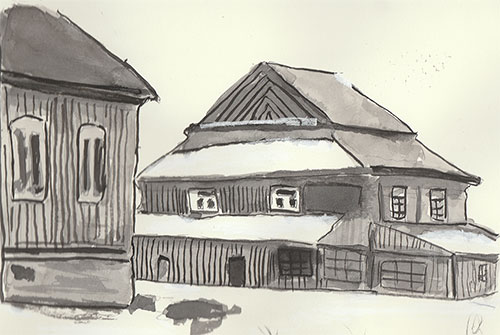Lost Treasures: The Wooden Synagogues of Eastern Europe The Artwork of Bill Farran
Bakałarzewo, Poland - Sumi-e Style Brush Painting
Bakałarzewo, Poland - Sumi-e Style Brush Painting
Yiddish: Baklerove
Bakałarzewo, once part of the Polish-Lithuanian Commonwealth, is a village in Poland, set among dense forests, beautiful hills, and rivers. According to 17th century Parish Chronicles, the town’s name was derived from a bachelor who once lived there. Bakałarzewo became an active town with the arrival of merchants and the establishment of trade during the mid-1700’s, with a Jewish population settling around 1670.
By the 19th century, more than threequarters of the town’s population was Jewish and a wooden synagogue was constructed during 1849.
In 1870, Russian authorities reduced Bakałarzewo to the status of a village as a punishment for the town’s participation in the January Uprising. No longer able to hold fairs, a massive portion of income was lost. The assassination of Tsar Alexander II in March 1881 resulted in state sponsored pogroms against Jews and many of the town’s Jews emigrated to the United States or larger towns.
The town suffered great hardship during World War I, when Bakałarzewo was devastated. Again, Jews fled, although some chose to return later. Many found their homes destroyed but were determined to rebuild their lives.
By 1939, however, most of Bakałarzewo’s Jews had left the town, realizing their proximity to Germany presented great danger. Their assumption was correct as the town was burned down by German bombs on the first day of Worl War II.
